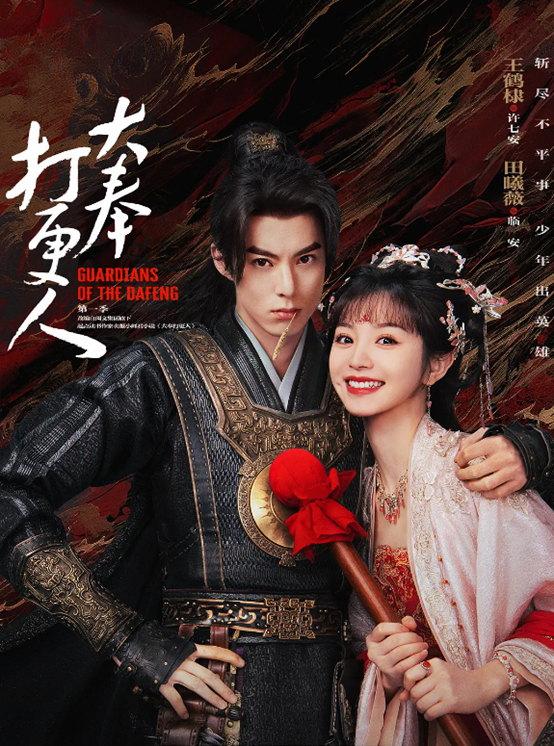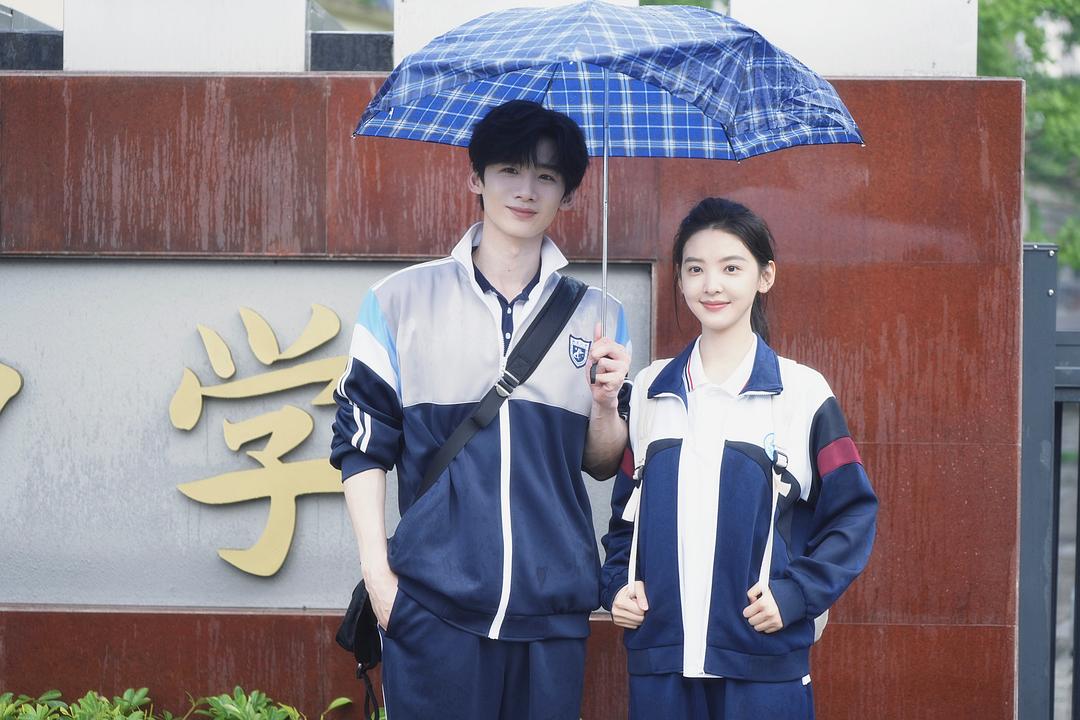
Note: Almost every month, some online articles are adapted into TV series, and there are always many pros and cons of online article adaptations. The monthly online article adaptation observations extract a common problem in the online article adaptations of the month, and look through the phenomenon to the essence with everyone. The online article adaptation focused on in January is "Dafeng Night Watchman", which discusses the dilemma of male online article IPs in film and television adaptations.

Poster of "Dafeng Night Watchman"
It's not hindsight. From the beginning, I was puzzled by the fact that the TV version of "Dafeng Night Watchman" was generally favored by so many people before it was aired: Is it because there are not enough flops after the big male IPs are adapted into movies? Although "Zui Xu" directed by Deng Ke is a dark horse, "Zui Xu" has little to do with the novel. If it goes the comedy route, will Wang Hedi have the natural sense of humor like Guo Qilin?
In short, everyone from the platform to the film company to the actors was so confident that they even held a grand ceremony to set the release date. The fact confirmed my concerns: any behavior of opening champagne halfway through is dangerous.
"The Night Watchman of Dafeng" is adapted from the novel of the same name serialized on Qidian Chinese website by the Newspaper Boy. Since its launch in June 2020 to its completion in August 2021, it has long and steadily occupied the top position in the sales and monthly ticket charts. The average subscription of VIP chapters has reached 200,000, which may be one of the top male-oriented online literature IPs since the 2020s.
However, no matter how big the male-oriented online novel IP is, it has no direct correlation with its film and television adaptation performance. According to past adaptation experience, even if the novel is top-tier, the production is top-tier, and the actors invited are also popular, the male-oriented dramas will often fail.
“Fighter of the Destiny” adapted from Mao Ni’s novel of the same name, flopped; “Martial Universe” adapted from Tian Can Tu Dou’s novel of the same name, flopped; “Battle Through the Heavens” adapted from Tian Can Tu Dou’s novel of the same name, flopped; “Sword Dynasty” adapted from Wu Zui’s novel of the same name, flopped; “Ever Night 2” adapted from Mao Ni’s novel of the same name, flopped; “The Great Lord” adapted from Tian Can Tu Dou’s novel of the same name, flopped; “Road to Awakening” adapted from Hu Die Lan’s novel of the same name, flopped; “Douluo Dalu” adapted from Tang Jia San Shao, flopped; “Snow Blade” adapted from Feng Huo Xi Zhu Hou’s novel of the same name, flopped in word of mouth…
The relatively well-received dramas include Ever Night in 2018 and The King's Avatar in 2019, but they are not very popular. The dark horse hit Son-in-law in 2021 does not have a strong male-oriented color and is not closely related to the original novel by Angry Banana. Therefore, strictly speaking, the only male-oriented drama adaptation that has both good reputation and high broadcast volume is Joy of Life (including Joy of Life 2, which is collectively referred to as Joy of Life for the convenience of writing).
"Da Feng Da Ye Ren" can't be called a hit. The popularity of the series on the platform finally broke 30,000 until the 28th episode (for comparison, the popularity of "Nine Layers Purple" broke 30,000 in the 15th episode, not to mention the real male-oriented hit "Joy of Life 2" reached 30,167 in just 57 minutes of its premiere), and until the super-point ending, the highest popularity of "Da Feng Da Ye Ren" was only 30,128 (lower than "Nine Layers Purple"'s 30,234). This is like a movie with an investment of 10 million yuan but a box office of 100 million yuan is a hit, while a movie with an investment of 50 million yuan but a box office of 100 million yuan is definitely a failure. This is a fact that fans can't change no matter how they try to save their reputation.

"Dafeng Night Watchman" Douban score 5.4 points
Once again, the male-oriented online literature IP failed to be adapted into a film or TV series, due to the same pitfalls that had been encountered before, which were not avoided this time.
Why is it difficult to adapt male-oriented online novels?
There is a clear distinction between male-oriented and female-oriented literature in terms of content orientation. Generally speaking, in female-oriented literature, the female protagonist faces a real world or a quasi-real world, which mainly interprets the specific gender dilemmas of women. These dilemmas are not limited to traditional family conflicts, but also include broader social challenges. These dilemmas are specific, real and delicate, and there is no psychological distance between them and the audience after being adapted into films and TV series.
In male-oriented literature, because men, who have the gender advantage, "naturally" do not have some of the troubles that women have, the authors tend to construct a grand worldview and create an all-encompassing and complex virtual world with a unique geographical environment, political system, cultural customs, and a complete set of magic or technology systems, exploring grand propositions such as the fate of the country and the laws of heaven and earth. Male-oriented literature satisfies male readers' needs for a sense of power and accomplishment, and also provides them with a spiritual sustenance to escape the pressure of reality.
For example, the worldview of the novel "Celebrating Yu Nian" is quite complex: the story is set in the future Earth after a nuclear war. Human civilization is almost extinct because of the nuclear war. The survivors rebuild civilization under the guidance of the temple, but are restricted to the feudal era. Qingguo is such a country. The protagonist Fan Xian, as a time traveler, comes to Qingguo with modern knowledge and memories...
After the adaptation, "The Son-in-Law" has almost become a pure light comedy. The world view of the original novel is also very huge: in a fictional Wu Dynasty, Ning Yi, as a modern soul traveler, experienced the transformation from a son-in-law to a business tycoon, and was involved in the disputes of family, country and the world. The novel is a mixture of the narrative style and themes of "Dream of Red Mansions", "Water Margin" and "Romance of the Three Kingdoms", covering everything from family fights, business wars to power struggles, officialdom, military affairs and history.
The worldview of "Dafeng Night Watchmen" is equally grand. The story is set in the fictional Dafeng Dynasty, where there is a special organization - "night watchmen", similar to the Jinyiwei of the Ming Dynasty or the Supervisory Council in "Joy of Life". It is a secret intelligence and law enforcement agency directly under the emperor, engaged in reconnaissance, arrest, interrogation, collecting military intelligence, and inciting enemy generals to revolt. At the same time, this world not only has monsters, but also a variety of cultivation systems. In addition to warriors, there are sorcerers, Confucianists, Buddhists, Taoists, wizards, and Gu masters. Different cultivation systems have different grades, and different practitioners have their own unique skills and status.
The protagonist Xu Qian'an, a modern man who graduated from a police academy, accidentally traveled to this world and became a night watchman. The story revolves around Xu Qian'an's growth, starting with solving a case of missing tax silver, and gradually uncovering a series of major cases involving court struggles, people's suffering, and mysterious forces.

Xu Qi'an (played by Wang Hedi)
In the world of online literature, female and male content each have their own audiences. But in the drama market, to become a hit, it must appeal to both men and women, especially, "whoever wins the women wins the world" is almost an iron rule. The audience structure of the drama market is dominated by women, accounting for more than 60%, and female audiences are also the key force driving topic popularity and social network discussions.
Female-oriented literature can be adapted honestly to approach its target audience, but male-oriented literature cannot abandon its huge male audience group after being adapted into film and television, especially fans of the original novel. After all, this is the value of the IP.
This is what makes it particularly difficult to adapt male-oriented literature: from being "male-oriented" to being "universal-oriented."
How to implement the grand worldview
The first and biggest challenge that needs to be faced in adapting male-oriented literature is the key to success or failure - how to implement the grand worldview.
Many failed male-oriented dramas in the past have proven that trying to directly copy the worldview of a novel when adapting it into a film or TV show is almost certain to fail.
Online writing allows authors to use detailed text to construct a complex worldview, but this is rarely applicable to film and television dramas, which are visual arts that rely mainly on images, actions and dialogues to gradually reveal the story background. Most of the male-oriented dramas that failed to win the street, most of them start with an animated special effect, and then the male voice-over begins to read the worldview, which is difficult for the audience to digest and also affects the viewing experience.
The quality of special effects and scene design directly affects the audience's identification with the fictional world. In online articles, authors have great freedom to describe martial arts scenes, without being restricted by the laws of physics or realistic conditions, creating imaginative action sequences and fighting techniques. Anyway, no matter how the text is written, it is free. When such text is converted into images, it is necessary to consider the technical feasibility of actual shooting, which relies heavily on special effects. Due to budget and technical level limitations, most male IP dramas find it difficult to achieve the spectacular scenes and magical abilities depicted in the original works. What the audience sees is 50 cents special effects, which is quite bad.
This is the first pitfall of "Dafeng Night Watchman" - copying the world view. It's not that the special effects are too bad (the special effects of the series are large and the effect is acceptable, the investment must be not low), but the world view is too complicated.

The special effects of "Dafeng Night Watchman" are not small
In the worldview of the online novel "Dafeng Night Watchman", the feudal dynasty coexists with the cultivation system, scientific and technological progress coexists with magic and illusion, there are both ancient bureaucratic systems and social structures, and supernatural powers and technological miracles... Readers will not feel confused or contradictory, because through a large amount of text to describe the setting in detail, readers can gradually understand, such as elaborating on how the feudal dynasty and the cultivation system affect each other, and how technology and magic coexist. Readers can digest information independently when reading and build a clear picture of the world.
However, due to the length and form of expression, it is difficult to explain the complex settings in detail when adapted into a film or TV series. In the TV version of "Dafeng Night Watchman", Xu Qian'an sometimes uses modern scientific knowledge to solve cases (such as the disappearance of tax silver), and sometimes sees the use of various mysterious magic (such as using the "heart-searching technique" to directly ask the other party's true feelings). Since various magic (the essence of magic is the "golden finger") is so powerful, how much real wisdom is needed?

The "heart-searching technique" that can directly ask the truth
The world in the play sometimes seems very ordinary, but some of the magic is too fantastic, which makes the story seem like a fantasy play, and even makes people feel very contemporary - for example, Xu Qian'an will use a "jade mirror" to make calls, and one of the functions of the jade mirror in the play is almost equivalent to a mobile phone...

A small jade mirror that can be used for long-distance communication
The forces in the play include various forces in the court (Ministry of Justice, Ministry of Personnel, Night Watchmen, Imperial Observatory, Yunlu Academy, King of Zhenbei, etc.), as well as the "Tian Di Society", Tianyu, Wushen Sect, Kui Clan... They are scattered in several cases in the play - the tax silver case, the silver gong cutting case, the Sangpo case, the magic fight, the bloody massacre of three thousand miles, etc. The relationships are complicated and it is quite difficult to sort them out.

"Tiandi Club"
For example, the mysterious organization "Tian Di Hui" (the Tiandihui in the novel) has a numbering system to identify the identities of its members. There are nine numbers in total, and each person is a person with peerless martial arts or a strong network of relationships. Xu Qian'an becomes member number 3. In the novel, their identities and relationships can be patiently laid out, but the drama can only briefly mention who the other numbers are, outputting information to the audience in a rigid manner, and the dialogue is long and boring.
It can be said that the worldview of the drama version of "The Night Patrol of Dafeng" gives people the experience of "indoctrination" - the complex world settings and background information are stuffed to the audience all at once in a limited time. Various concepts and spells come one after another. The concepts are very complicated and there are many characters. It lacks the necessary preparation and gradual development process, which is not easy to digest and absorb, and it has not formed a unified and harmonious system. It greatly affects the audience's sense of conviction and immersion in the world of the play.
How should the grand worldview be implemented? "Joy of Life" and "The Son-in-law" are two completely different routes.
The Son-in-Law almost completely abandons the novel's vast worldview, and the series focuses on a crosstalk-style light comedy, and comedy elements such as the Men's Morality Academy, knife fights, and parking spaces are also well used. But the adaptation case of The Son-in-Law is difficult to emulate. Once many male-oriented novels lose their worldview, they also lose their charm. Although the drama version of The Son-in-Law is successful, it does not capture the essence of the novel.
The world view adaptation of "Joy of Life" is successful.
The drama version sets the entire story as a novel written by a modern man named Zhang Qing. As the plot develops, the audience follows Zhang Qing's pen into the fictional historical world he created, namely the Kingdom of Qing where Fan Xian lives.
Unlike the novel, the TV series does not introduce the worldview in detail at the beginning, but chooses a gradual presentation method, slowly introducing a few key concepts as the plot progresses, and makes a lot of choices and appropriate changes to allow the audience to gradually adapt to the world of Qing Kingdom where Fan Xian lives. This method avoids information overload and allows the audience to naturally understand the background knowledge as the story progresses.
"The Night Watchman of Dafeng" does not know how to do subtraction, and its "greed for perfection" backfires.
How to use comedy elements
The "landing" of a grand worldview is not just about presenting the worldview, but more importantly, presenting the universal dilemma of mankind that online literature wants to express through the grand worldview. Whether it is the fantasy of traveling through time and space, the conspiracy of fictional history, or the fantasy of future technology, its core often explores eternal human issues such as human nature, love and hate, life and death, freedom and bondage.
From an aesthetic point of view, when a drama intends to explore deeper themes, such as characters fighting against fate or pursuing fairness and justice, tragedy is almost inevitably the tone of the story, because true resistance must involve sacrifice and cost, otherwise it is not resistance.
Therefore, don't misunderstand that "Celebrating More Than Years" is just a comedy. Fan Xian's growth path seems to be a "cool" journey, but the series of setbacks and sacrifices he experienced constitute an indispensable tragic element in the work. The series did not avoid the cruel reality of feudal society. Through a series of gripping plots, such as the death of Teng Zijing and the execution of Lai Yushi, it deeply exposes the tyranny and ruthlessness of feudal imperial power, as well as the tragic fate of small people in the power struggle.
In a sense, the themes of "The Night Patrol of Dafeng" and "Joy of Life" are similar, both of which express "feelings" in a "cool" way.
For example, during a house search mission, Xu Qian'an saw his colleague Zhu Chengzhu Yinluo bullying others and trying to humiliate an innocent girl of 13 or 14 years old. The fire of justice in his heart was instantly ignited. Although people around him repeatedly reminded him to be patient, Xu Qian'an could not sit idly by. He resolutely drew his sword and killed Zhu Chengzhu. When people around him asked Xu Qian'an, "Is it worth it? Is it worth it for a woman you don't know?" Xu Qian'an replied, "There are always things that are more important than life."

Xu Qian'an's behavior violated the rules of the night watchman and he was sentenced to beheading. His fate hung in the balance. He held on to his beliefs and questioned his superior Wei Yuan whether he still remembered his original intention of serving the people. After receiving a positive answer, Xu Qian'an said, "You eat your salary, the fat of the people. It is easy to abuse the people, but it is difficult to deceive God." "This is also what I really think." This sentence appears repeatedly in the novel, and it is also a kind of justice that Xu Qian'an pursues: cherish the people's strength, put the people first, and do not abuse power and oppress the people.

"You eat your salary, the people's fat and blood. It is easy to abuse the people, but it is hard to deceive God" is the "feeling" that "Dafeng Night Watchman" wants to express.
But why is it that when the TV version of "Dafeng Night Watchmen" reproduced these "emotional" famous scenes in the novel one by one, the effect was greatly reduced, and it couldn't even be said to be popular? In contrast, after "Celebrating More Than Years" was adapted into a film and television series, all the famous scenes in the novel were restored, and the screenwriter Wang Juan even created a lot of passionate "emotional" scenes, which were all impressive and successfully helped the series to become popular.
One obvious reason is that Wang Hedi really needs to work harder on his lines. Some famous lines in the novel were read out by him with a thin voice, non-standard pronunciation, and unclear articulation. There was absolutely no such passionate experience as when reading, and the power and appeal were all wilted.
The more fundamental reason is that the drama version of "The Night Watchmen of Dafeng" has a light comedy tone that allows for freedom. Because it lacks a deep tragic background, Xu Qian'an's character appears "frivolous" and his predicament loses its weight.
On the one hand, Xu Qian'an's "golden finger" is exaggerated to the point of being almost a fantasy: he possesses the most powerful magic, he can defeat the most powerful enemy, he possesses the noblest qualities, and the most powerful people will protect him... It can be said that "with divine magic on his side, he can become the overlord, and beauties like jade are wandering around the corridors. All powerful enemies are destroyed and his prestige is displayed, and he alone possesses the best and his character is prominent. With the protection of the giant, he is free from danger, and such an adventure is too absurd. The fantasy is excessive and the plot is excessive, which only brings superficial pleasure and loses the charm."

Xu Qian'an is often blessed with great fortune.

Xu Qian'an "resurrected from the dead"
Except for the final case of "Bloody Massacre of Three Thousand Miles" in episodes 36-40, Xu Qi'an had almost no real sacrifices and losses before that. Whenever he encountered a crisis, there was always a mysterious power or a master to help him get through it smoothly. For example, he was sentenced to be beheaded and soon had the opportunity to make amends, and he "died" and was "resurrected" quickly without paying any real price. With such frequent arrangements, it is difficult for the audience to believe that the difficulties Xu Qi'an experienced are real and serious.
On the other hand, because there is no real tension, the series cannot portray Xu Qian'an's inner world. It lacks a specific display of the motivation behind his choices at critical moments, his inner struggle and determination when facing difficult choices, as if he graduated from the police academy before traveling through time, so he is naturally righteous after traveling through time. The audience sees a character with various convenient conditions and lucky blessings, rather than a character who has truly experienced hardships and grown up through difficult choices.

Xu Qian'an's "unparalleled firmness and ordinary mind" are untested and naturally possessed.
In contrast, "Celebrating More Than Years" has a profound presentation of Fan Xian's inner transformation. When he first entered the Kingdom of Qing, he was skeptical of Ye Qingmei's grand legacy, thinking that it was just an idealistic fantasy. However, after experiencing power struggles and witnessing the sufferings of the world, his heart was gradually touched and he was determined to fight to break the shackles of class and let ordinary people have more dignity and freedom. Behind Fan Xian's occasional sense of humor is the alertness and vigilance for survival, which also neutralizes the heaviness of the tragedy.
To be fair, the ending of "Dafeng Night Watchman" is good, and the "bloody massacre of three thousand miles" case has a strong tragic color. In order to pursue personal spiritual power and higher power, the King of Zhenbei slaughtered 380,000 people in Chuzhou, treating the lives of the people as ants. This crazy behavior reveals the extreme corruption of power when there is no restraint; Zheng Xinghuai wanted to seek justice for the people of Chuzhou, but encountered many obstacles, suffered injustice, and died tragically in prison, which fully exposed the darkness of the feudal imperial system, justice was difficult to uphold, and the truth was wantonly covered up.

The King of Zhenbei regarded human life as worthless, and the tragedy of "bloodbath for three thousand miles" occurred.

Xu Qian'an seeks justice for Zheng Xinghuai and the people
It is sad that Xu Qian'an was "forgotten" by everyone. He experienced many hardships and obstacles in Dafeng and made many efforts to protect the people of Dafeng and justice. In the end, he disappeared from everyone's memory, and his past achievements and emotional ties with relatives and friends also dissipated. Like a lonely hero, he quietly retreated in the corner of history.
Unfortunately, the majority of the drama is exaggerated, so that the belated deepness at the end seems like "happy beginning and sad end". Before the end, "Dafeng Night Watchman" tried too hard to be a light comedy, but it is neither like "The Son-in-law" which does not have to carry the world view and is completely relaxed, nor like "Joy of Life" which has a tragic core from beginning to end. In the end, it gives people the feeling that it keeps falling apart, and just when it finds the rhythm, the song ends and everyone disperses.


